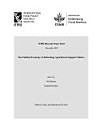Global food security impacts of extreme weather events and occurrence of breadbasket failures
Martin, Will · Nia, Reza · Vos, Rob
Sep 2025 · IFPRI Discussion Papers Book 2360 · Intl Food Policy Res Inst
Ebook
60
Pages
family_home
Eligible
info
reportRatings and reviews aren’t verified Learn More
About this ebook
Agricultural yield shocks are frequently correlated across countries and much of the recent literature concludes that both the volatility of shocks and the extent of correlations across countries are likely to increase substantially with climate change. Given this background, it seems important to consider the potential impacts of large, synchronized yield shocks in both developing and developed countries. These shocks are examined using IFPRI’s MIRAGRODEP model and the linked POVANA household models to assess the impacts on real incomes, food prices, poverty and food insecurity. The results of a 25% reduction in productivity in South Asia and Eastern and Southern Africa are compared with a similar productivity reduction in Europe and North America. The results make clear that the adverse impacts on global poverty and food security are much more severe when the shock originates in developing countries. The results point to a need for quite different policy responses in the case of a multiple breadbasket failure arising in the global south, rather than—like the three most recent food crises—in the global north.
Rate this ebook
Tell us what you think.
Reading information
Smartphones and tablets
Install the Google Play Books app for Android and iPad/iPhone. It syncs automatically with your account and allows you to read online or offline wherever you are.
Laptops and computers
You can listen to audiobooks purchased on Google Play using your computer's web browser.
eReaders and other devices
To read on e-ink devices like Kobo eReaders, you'll need to download a file and transfer it to your device. Follow the detailed Help Center instructions to transfer the files to supported eReaders.










